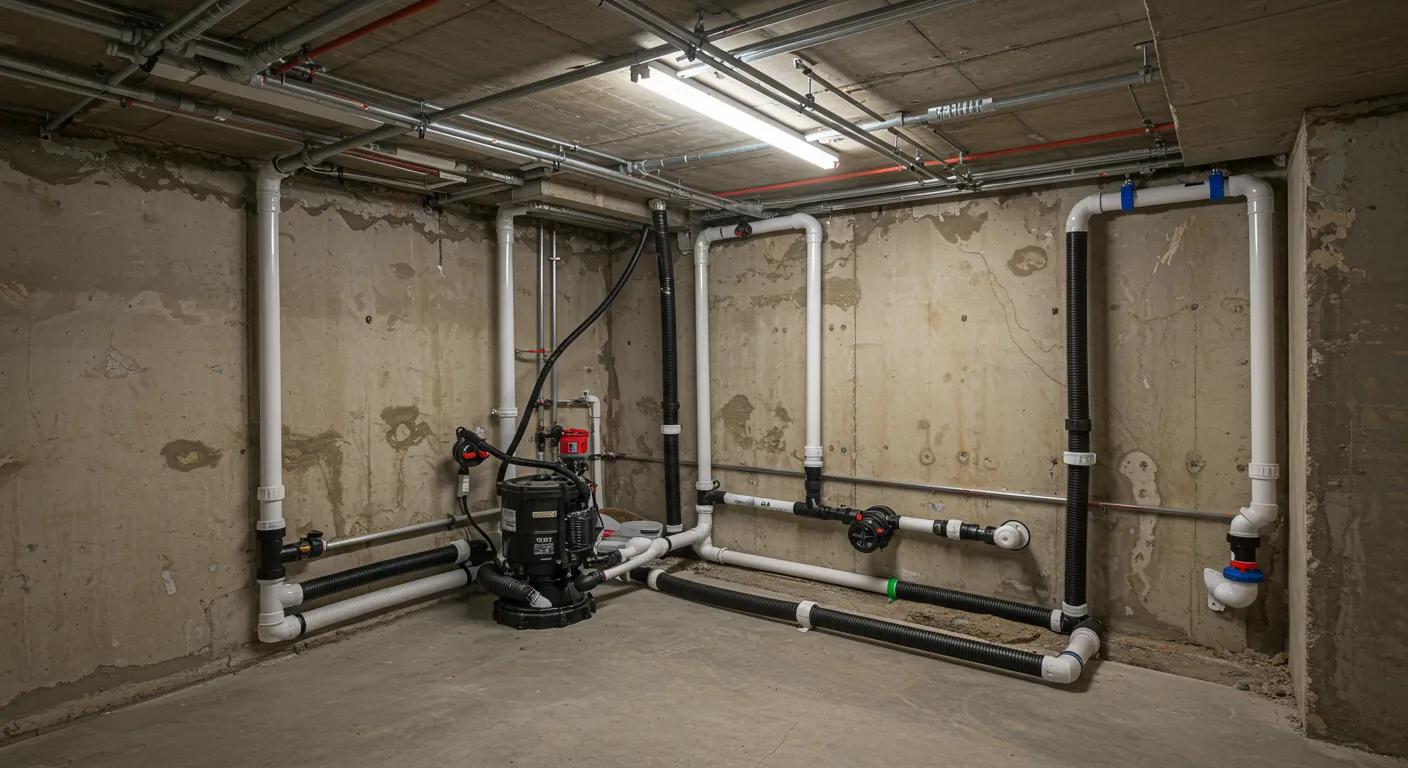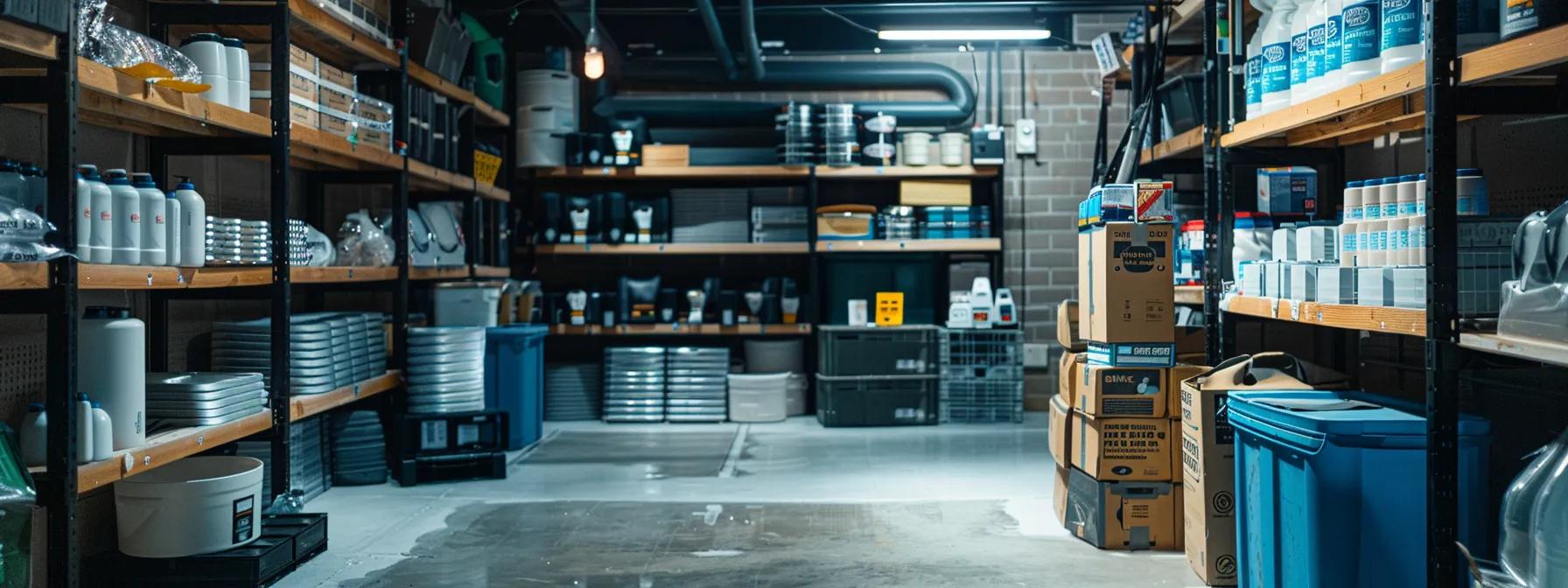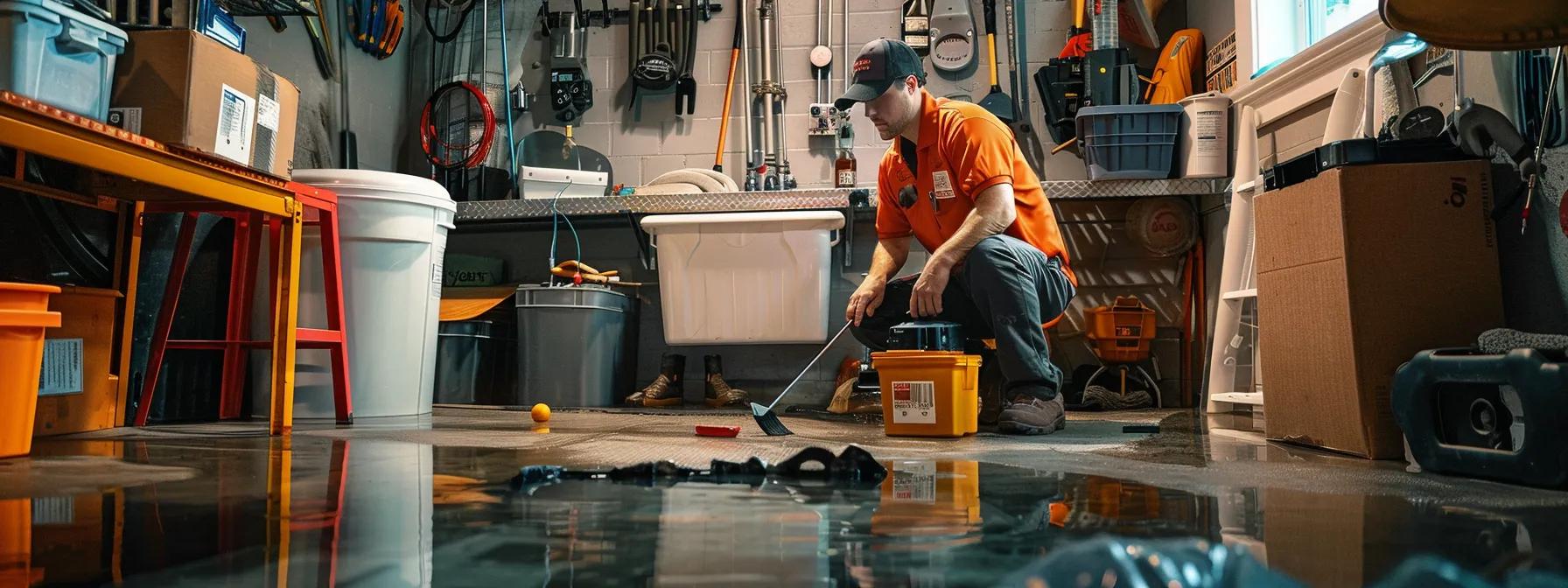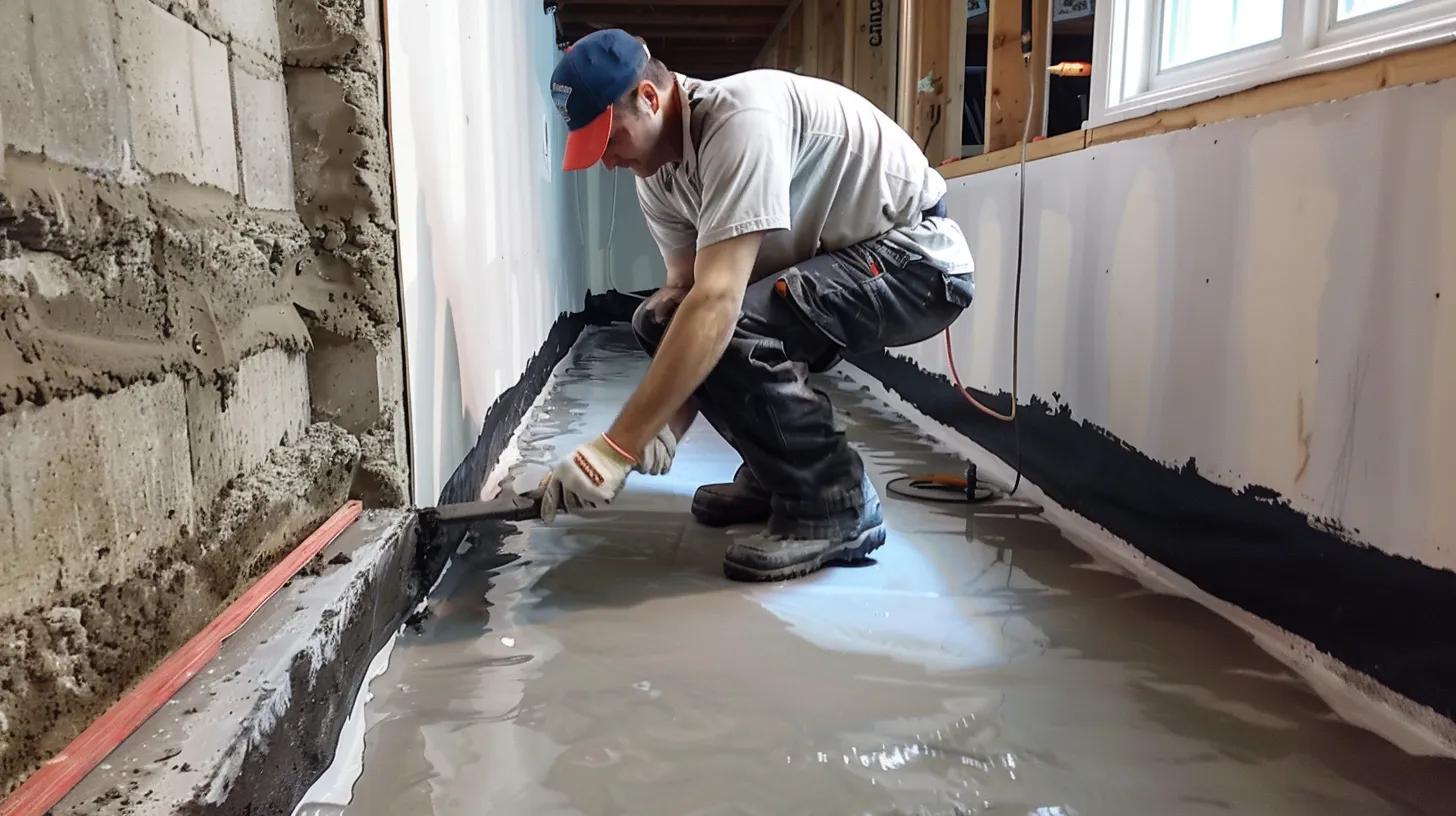Best Basement Flooding Solutions for Chicago Homes
Basement flooding is one of the most disruptive issues that Chicago homeowners face. With the city’s unique climate, heavy rainfall, and urban soil conditions, an unexpected flooded basement can lead to costly repairs, mold growth, and compromised safety. At CW Basement Waterproofing, we believe that protecting your basement is about ensuring long-term foundation stability and safeguarding your family’s health and property. In this article, we provide a comprehensive overview of effective basement waterproofing solutions for Chicago homes by addressing interior and exterior waterproofing techniques, the role of sump pumps and drainage systems, and key repair and maintenance services. Our strategies are designed to meet Chicago’s soil, weather, and building code requirements, offering practical tips honed over 20 years of field expertise to help you detect early signs of water damage and choose the best basement waterproofing Chicago methods for your home.
Key Takeaways
- We offer both interior and exterior waterproofing solutions tailored for Chicago homes.
- Our guide covers sump pumps, drainage systems, and essential foundation repairs with practical examples.
- We explain early warning signs of water damage and the importance of regular maintenance.
- Local soil, weather conditions, and building codes are integrated into our waterproofing approach.
- CW Basement Waterproofing delivers actionable recommendations that provide lasting peace of mind.
What Are the Most Effective Basement Flooding Solutions for Chicago Homes?

Effective basement flooding solutions involve proactive and reactive measures. We start with a detailed assessment of your home’s risk factors—including soil permeability, local climate patterns, and existing drainage system quality. Our interior waterproofing methods, such as sealing cracks, applying vapor barriers, and installing drainage channels, divert water away from the foundation. Exterior solutions, like installing french drains and regrading landscapes to direct stormwater away from the structure, further reduce risk. Combined, these measures can lower water intrusion by up to 70% in vulnerable homes.
Additionally, specialized equipment like sump pumps plays a critical role in managing groundwater. These pumps collect water in a sump basin and discharge it away from your home, with high-quality models featuring check valves to prevent backflow during outages or severe weather. We also include foundation repairs when necessary to address existing cracks and structural weaknesses. In Chicago’s environment of compacted soil and urban runoff, our multi-faceted approach ensures durable basement protection.
How Does Interior Waterproofing Prevent Basement Flooding?
Interior waterproofing creates a barrier that stops water from seeping through porous concrete walls and floors. The process involves applying advanced sealants and installing drainage channels and vapor barriers. Cracks or gaps in walls and floors are sealed with epoxy or polyurethane products that bond with the concrete to form a continuous, durable membrane. Additionally, a network of perforated pipes around the basement perimeter collects and directs any penetrating water to a sump pump for removal.
This technique not only reduces water pressure against the foundation but also enhances humidity control, thereby lowering the risk of mold growth and further structural damage. Homeowners often notice improved indoor air quality and a drier, healthier environment following installation.
What Exterior Waterproofing Techniques Work Best in Chicago?
Exterior waterproofing provides a defensive barrier before water reaches the walls and foundation. In Chicago, the most effective techniques include installing french drains and ensuring proper grading. french drains, made up of trenches filled with gravel and perforated piping, help direct stormwater away from the foundation by reducing hydrostatic pressure. Proper regrading of the surrounding landscape ensures water flows away from the building, while exterior sealants and waterproof coatings protect concrete surfaces from water and deicing chemicals. Strategic downspout placement and gutter extensions further minimize water pooling, ensuring robust exterior protection.
How Do Sump Pumps Help Manage Basement Water Intrusion?
Sump pumps serve as a last line of defense when water bypasses other waterproofing measures. Installed in a sump basin at the lowest point of the basement, they collect accumulated water and pump it away to a designated drainage area. Modern sump pumps have automatic sensors that activate the pump when water reaches a specific level and include battery backups to maintain operation during power outages. Regular maintenance—such as cleaning and checking the battery—is crucial for optimal performance. Homeowners report significantly reduced water-related damage during storms when a properly functioning sump pump is in place.
When Is Foundation Repair Necessary to Stop Flooding?
Foundation repair becomes necessary when structural weaknesses allow water to penetrate despite waterproofing efforts. Over time, shifts and settlement can cause cracks in the foundation that act as channels for water. If you observe recurring seepage or visible cracks in concrete walls or floors, it is a clear sign that repair is needed. Methods such as crack injection, slab jacking, or more extensive structural reinforcement help restore foundation integrity. Regular inspections in Chicago’s variable climate are essential for early detection, and combined with waterproofing, repairs offer long-term stability against future flooding.
How Can Chicago Homeowners Identify Basement Flooding Risks Early?
Early identification of basement flooding risks is key to preventing extensive damage and costly repairs. Homeowners should adopt a proactive approach by monitoring for early warning signs such as damp or musty odors, water stains, peeling paint, and efflorescence—a white, powdery residue. These indicators suggest minor water seepage that may lead to mold and structural damage if left unaddressed.
Regular inspections, including the use of moisture meters or digital sensors, help monitor changes in humidity levels. It is also important to ensure that exterior drainage systems, gutters, and downspouts are functioning properly, and that the soil around your home slopes away from the foundation. Combining visual checks with sensor-based monitoring creates a comprehensive early-warning system that can significantly reduce the risk of major flooding incidents.
What Are Common Signs of Basement Water Damage?
Common signs include cracks in walls and floors, discoloration or staining, persistent dampness, mold growth, and a musty odor. Stored items may become waterlogged, and efflorescence can form on surfaces where minerals meet evaporating moisture. Recognizing these symptoms allows for timely intervention to prevent further damage and higher repair costs.
Routine maintenance and professional inspections are critical for catching these issues early. Adjustments such as improving ventilation or modifying existing waterproofing systems can be made once initial signs are detected.
How Does Soil and Climate Affect Flooding in Chicago Basements?
Chicago’s soil, often composed of clay and silt, retains water and increases hydrostatic pressure on basement walls. When saturated, these soils can force water into the basement despite waterproofing measures. Coupled with Chicago’s climate—characterized by heavy downpours, rapid snowmelt, and fluctuating water tables—these conditions create significant challenges for maintaining a dry basement. Seasonal fluctuations and urbanization further exacerbate water accumulation.
Understanding these factors allows homeowners to tailor their waterproofing solutions, such as through effective drainage systems and appropriately sized sump pumps, to better manage local soil and climate challenges.
Why Is a Professional Basement Inspection Important?
Professional basement inspections use specialized tools—like moisture meters, infrared cameras, and structural imaging—to identify both current water damage and potential vulnerabilities that might be missed during a casual check. These assessments provide critical insights into your foundation’s condition and the effectiveness of your waterproofing measures. Early detection through a professional inspection facilitates timely repairs and regular maintenance, saving homeowners from more expensive future damages. At CW Basement Waterproofing, our comprehensive inspections ensure that your basement remains secure and dry over the long term.
Which Basement Waterproofing Materials and Products Are Best for Chicago Homes?

Choosing the right materials is essential for effective basement waterproofing in Chicago’s challenging environment. Homeowners typically rely on a combination of vapor barriers, sealants, and drainage systems. High-quality sealants, including epoxy injections and polyurethane coatings, fill gaps and cracks in concrete, while vapor barriers applied to walls and floors help reduce moisture migration. These materials are proven for their durability and resistance to extreme weather.
Interior drainage products, such as french drains and engineered sump pumps, further divert water away from the foundation. Our product recommendations are based on rigorous testing and real-world performance, often reducing water intrusion by up to 80% when properly installed.
What Are the Benefits of Vapor Barriers and Sealants?
Vapor barriers and sealants act as protective shields that reduce humidity and prevent condensation within the basement. Polyethylene sheets or specialized membranes used as vapor barriers block water vapor transmission, while sealants address visible cracks and microfractures by bonding to concrete surfaces. This dual protection improves indoor air quality by limiting moisture and mold growth, resulting in a drier and structurally sound basement.
How Do French Drains and Interior Drainage Systems Work?
French drains consist of trenches filled with gravel and perforated pipes positioned around the basement perimeter. They capture water and redirect it away, reducing hydrostatic pressure on the foundation. Interior drainage systems complement this by using channel drains installed inside the basement to collect water near the floor and channel it to the sump pump. The integration of both systems is key to maintaining low humidity levels and preventing water seepage, ensuring a dry, healthy basement environment.
What Features Should You Look for in a Reliable Sump Pump?
When selecting a sump pump, key features include a high-capacity motor, automatic activation, and a built-in battery backup to ensure operation during power outages. A dependable check valve prevents backflow into the sump basin once the water is discharged. Many modern sump pumps come with digital monitoring systems, providing real-time data for proactive water management. At CW Basement Waterproofing, we recommend only those pumps that meet stringent performance standards and have proven effectiveness in urban environments.
How Do Chicago Basement Flooding Solutions Address Local Climate and Soil Conditions?
Chicago’s heavy rainfall, rapid snowmelt, and high water tables create a challenging environment for basement waterproofing. Local soils, rich in clay, retain water and increase hydrostatic pressure against your home’s foundation. Our basement waterproofing Chicago approach combines exterior and interior solutions—such as proper grading, french drains, and robust interior drainage systems—to manage stormwater efficiently before it reaches the foundation. We also select waterproof sealants designed to flex with temperature changes and soil movement. Adhering to local building codes further ensures that our systems provide reliable, long-term protection.
What Makes Chicago’s Climate Unique for Basement Waterproofing?
Chicago’s significant seasonal variation—cold, snowy winters and warm, humid summers—places unique stress on basement foundations. Freeze-thaw cycles can expand minor cracks, making the structure more vulnerable during rapid spring melts and summer storms. Heavy winter snowfall leads to substantial runoff during thaw periods, increasing water volume around the foundation. These conditions demand waterproofing solutions that are both robust and adaptable to temperature extremes and moisture fluctuations.
How Does Soil Composition Impact Flood Prevention Strategies?
The high clay content in Chicago soils retains water and creates elevated pressure on basement walls, often rendering conventional waterproofing measures less effective. In areas with higher sand content, water drainage is improved. Understanding your soil composition is key to selecting a strategy that may involve more robust exterior drainage systems, such as french drains and enhanced grading, combined with high-capacity sump pumps to counteract the pressure from retained water.
What Local Building Codes Affect Basement Flooding Solutions?
Local building codes in Chicago set minimum standards for drainage, foundation integrity, and waterproofing performance to address environmental challenges. These regulations may dictate the slope around a building, installation of french drains, or specific sealants on concrete. By ensuring that our solutions meet or exceed these codes, we provide systems that perform well under severe weather conditions and protect your property over the long term.
What Maintenance and Repair Services Ensure Long-Term Basement Flood Protection?

Long-term basement flood protection requires regular maintenance and periodic repairs. Scheduled inspections, cleaning of drainage channels, and system check-ups are vital to identify small issues before they develop into major problems. At CW Basement Waterproofing, we recommend routine maintenance, including checking sump pump operation and reapplying protective coatings as needed. Data from our service contracts show that well-maintained systems experience significantly fewer flooding incidents, extending the lifespan of your waterproofing investments.
How Often Should Basement Waterproofing Systems Be Inspected?
We advise that basement waterproofing systems be inspected at least once a year and after severe weather events. Annual inspections help detect wear in protective coatings, degraded sealants, or blocked drainage systems, allowing for timely maintenance. This proactive approach is critical to ensuring that components like sump pumps and french drains remain fully operational and effective.
What Are Common Repairs Needed for Flood Prevention Systems?
Over time, flood prevention systems may require repairs such as resealing cracks, reapplying waterproof coatings, repairing or replacing sump pumps, and unclogging drainage lines. Minor shifts in the foundation can reopen previously sealed areas, while debris in french drains may hinder water flow. Prompt repair of these issues prevents further deterioration and maintains system effectiveness.
How Can Homeowners Extend the Life of Their Waterproofing Solutions?
Homeowners can extend the life of their waterproofing solutions by adhering to a strict maintenance schedule—regularly cleaning drainage systems, inspecting for damage, and ensuring gutters and downspouts are clear. Using high-quality materials designed for Chicago’s harsh climate also contributes to durability. Combining self-monitoring with professional inspections, especially after extreme weather, helps sustain optimal system performance over many years.
How Much Do Basement Flooding Solutions Cost in Chicago?
The cost for basement flooding solutions in Chicago varies widely based on water damage extent, basement size, system type, and material quality. Typically, homeowners may spend between $3,000 and $15,000 on a complete system. Interior solutions, such as sealant application and drainage installation, tend to be less expensive than exterior measures like french drain installation and landscape regrading. Additional expenses may arise from necessary foundation repairs or high-tech sump pump installations with backup batteries. While the initial investment may appear high, long-term savings from avoided repairs and property damage often justify the expenditure.
What Factors Influence the Cost of Basement Waterproofing?
Costs are influenced by the complexity of the basement, the extent of water damage, and specific materials and techniques used. Labor rates, challenging soil conditions, and the need for advanced products like high-performance sump pumps also play significant roles. A detailed contractor assessment ensures that the chosen solution balances cost with effective performance.
How Do Interior vs. Exterior Solutions Compare in Price?
Generally, interior waterproofing methods are less expensive than exterior solutions because they require fewer materials and less labor. Exterior methods, such as installing french drains or regrading the landscape, involve more extensive work and higher material costs. Often, a combination of both interior and exterior systems is recommended for optimal protection, with long-term savings justifying the higher initial cost.
Are There Financing or Warranty Options Available?
To help manage upfront costs, many companies—including CW Basement Waterproofing—offer financing options and extended warranty programs. These financing plans allow homeowners to spread costs over time, while warranties (typically covering 5 to 10 years) provide assurance that any issues with materials or workmanship will be addressed promptly at no extra cost.
Why Choose Local Experts for Basement Flooding Solutions in Chicago?

Local experts understand Chicago’s unique climate, soil conditions, and regulatory environment. At CW Basement Waterproofing, our 20+ years of local experience enable us to tailor waterproofing strategies to the city’s specific challenges. We use high-quality materials that withstand rigorous weather patterns while complying with local building codes. Our prompt, personalized basement waterproofing Chicago service is especially valuable during emergency situations, ensuring your home is protected when you need it most.
What Are the Benefits of Hiring Chicago-Based Waterproofing Professionals?
Hiring local professionals means working with experts familiar with Chicago’s weather patterns, soil characteristics, and building codes. Their rapid response during emergencies, personalized assessments, and use of locally sourced materials ensure optimal performance in a humid, variable climate. Their extensive on-site experience minimizes risk and maximizes the durability of your waterproofing systems.
How Do Customer Reviews Reflect Service Quality?
Positive customer reviews provide real-world evidence of our service quality. Chicago homeowners frequently highlight our prompt emergency response, reliable sump pump installations, and noticeable improvements in basement dryness. These testimonials underscore our commitment to transparency in cost estimation and efficient maintenance, building trust and long-lasting satisfaction.
What Guarantees and Warranties Should You Expect?
When investing in basement waterproofing, expect comprehensive guarantees and warranties covering both materials and workmanship. At CW Basement Waterproofing, our installations are backed by warranties up to 10 years, ensuring that any issues are resolved promptly and at no extra cost. This commitment reinforces our confidence in the durability and effectiveness of our systems.
Frequently Asked Questions
Q: How often should I schedule a professional inspection for my basement waterproofing system? A: We recommend an annual inspection and one immediately after any major storm or flash flood. Regular inspections help detect minor issues early, ensuring consistent system performance.
Q: Can I combine interior and exterior waterproofing methods for better protection? A: Yes, combining both methods is highly effective. Interior methods (like crack sealing and drainage installation) work alongside exterior techniques (such as french drains and proper grading) to offer comprehensive protection against water intrusion.
Q: How reliable are sump pumps during power outages? A: Modern sump pumps include battery backup systems to ensure continuous operation during power outages. Regular testing of these backup systems is essential, and it is a standard practice in our installations.
Q: What steps can I take to prevent basement flooding during heavy rains? A: In addition to a reliable waterproofing system, maintain clean gutters and downspouts, ensure proper landscape grading, and keep drainage systems free of debris. Regular maintenance and prompt repairs are key.
Q: Are there financing options available for basement waterproofing projects? A: Absolutely. Many companies, including ours, offer financing and extended warranty programs, allowing you to spread the cost while ensuring top-quality protection.
Q: How do I know if my basement has experienced water damage even if it appears dry? A: Hidden signs may include a musty odor, peeling paint, or small cracks in walls and floors. Professional inspections using moisture meters or infrared cameras can detect underlying moisture issues.
Q: What maintenance tasks can I perform myself to help extend my waterproofing system’s life? A: Regularly check drainage channels for debris, inspect visible cracks or damage, and ensure that external water is directed away from the foundation by keeping gutters and downspouts clean. Self-monitoring combined with annual professional inspections will help maintain optimal performance.
